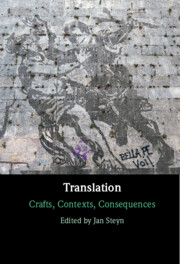Book contents
- Translation
- Translation
- Copyright page
- Dedication
- Contents
- Figures
- Contributors
- Acknowledgements
- Introduction
- Chapter 1 Solitude of the Translator
- Chapter 2 Translation, Creativity, Awareness
- Chapter 3 Anatomy of a Day in the Life of a Translator
- Chapter 4 Sturm, Drang and Slang
- Chapter 5 On X
- Chapter 6 Translating the Greeks
- Chapter 7 Beyond Faithfulness
- Chapter 8 Translation in and of Psychoanalysis
- Chapter 9 Translation across Brains and across Time
- Chapter 10 Covalent Effect
- Chapter 11 Notes on the Translator’s Space/The Editor’s Place
- Chapter 12 The State of Things
- Chapter 13 Translating into a Minor Language
- Chapter 14 An Other Language
- Chapter 15 Five Entries on Translation and Loss
- Chapter 16 ‘A Kind of Radical Positivity’
- Bibliography
- Index
Chapter 6 - Translating the Greeks
Published online by Cambridge University Press: 23 September 2022
- Translation
- Translation
- Copyright page
- Dedication
- Contents
- Figures
- Contributors
- Acknowledgements
- Introduction
- Chapter 1 Solitude of the Translator
- Chapter 2 Translation, Creativity, Awareness
- Chapter 3 Anatomy of a Day in the Life of a Translator
- Chapter 4 Sturm, Drang and Slang
- Chapter 5 On X
- Chapter 6 Translating the Greeks
- Chapter 7 Beyond Faithfulness
- Chapter 8 Translation in and of Psychoanalysis
- Chapter 9 Translation across Brains and across Time
- Chapter 10 Covalent Effect
- Chapter 11 Notes on the Translator’s Space/The Editor’s Place
- Chapter 12 The State of Things
- Chapter 13 Translating into a Minor Language
- Chapter 14 An Other Language
- Chapter 15 Five Entries on Translation and Loss
- Chapter 16 ‘A Kind of Radical Positivity’
- Bibliography
- Index
Summary
This chapter traces key moments and motifs in the history of the translation of Greek texts primarily into English. It highlights how Greek translation becomes paradigmatic for translation tout court, informing both translation rhetoric and practice, and then tackles the model cases of Homer and Sappho, the former diachronically, the latter synchronically through several case studies from the first half of the twentieth century. It homes in on modernist writers’ particular understanding of translation as poised between critical scholarship and creative practice in order to argue that poets such as H.D. or Ezra Pound evade or even subvert existing modes of conceptualizing both ‘Greece’ and translation, thus opening the way for the plethora of approaches that characterize Greek translation today. The chapter concludes with a cautionary note as it examines the programmatic resistance to Greek translation displayed by Virginia Woolf and Yorgos Seferis.
Keywords
- Type
- Chapter
- Information
- TranslationCrafts, Contexts, Consequences, pp. 82 - 111Publisher: Cambridge University PressPrint publication year: 2022

